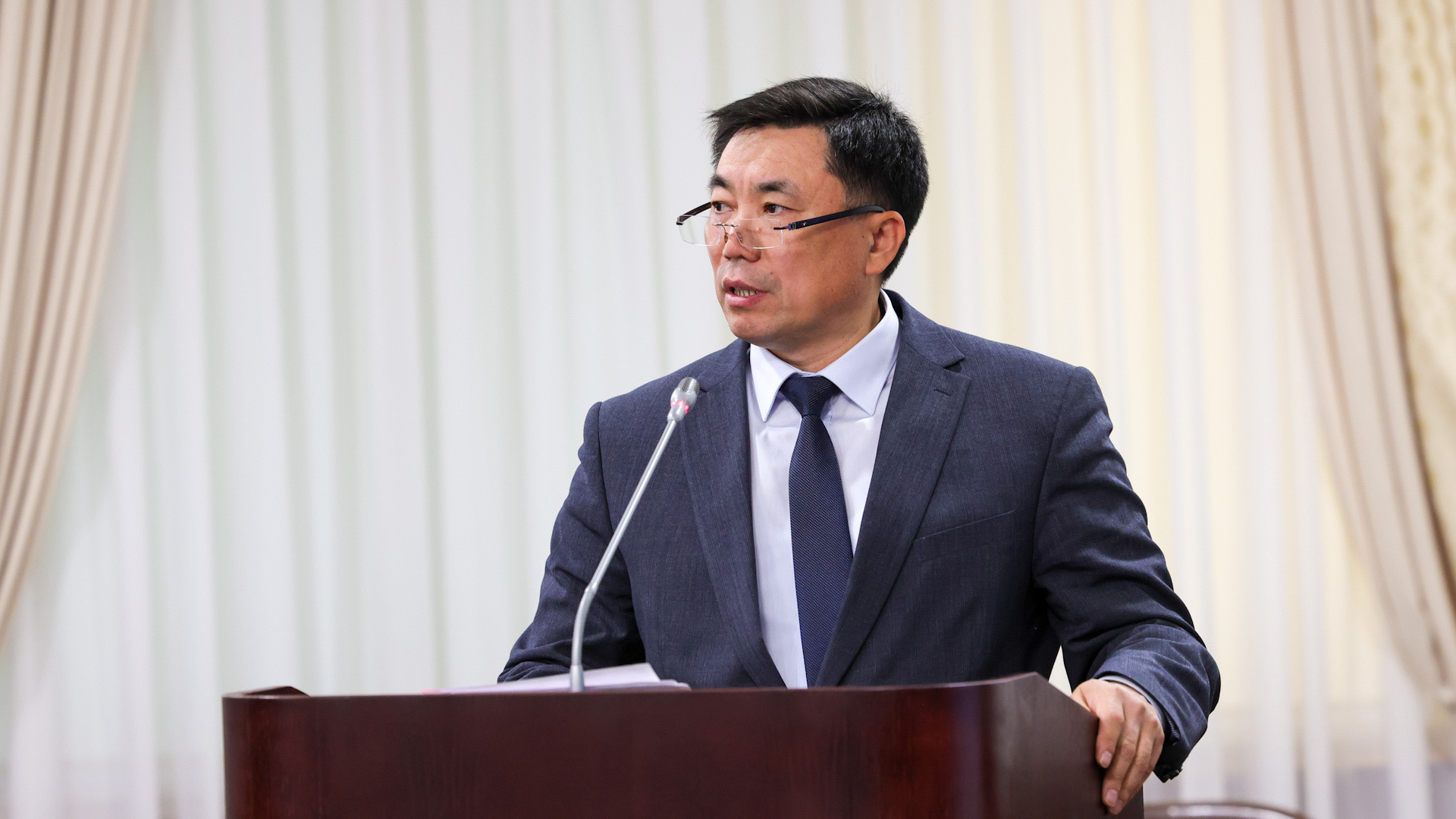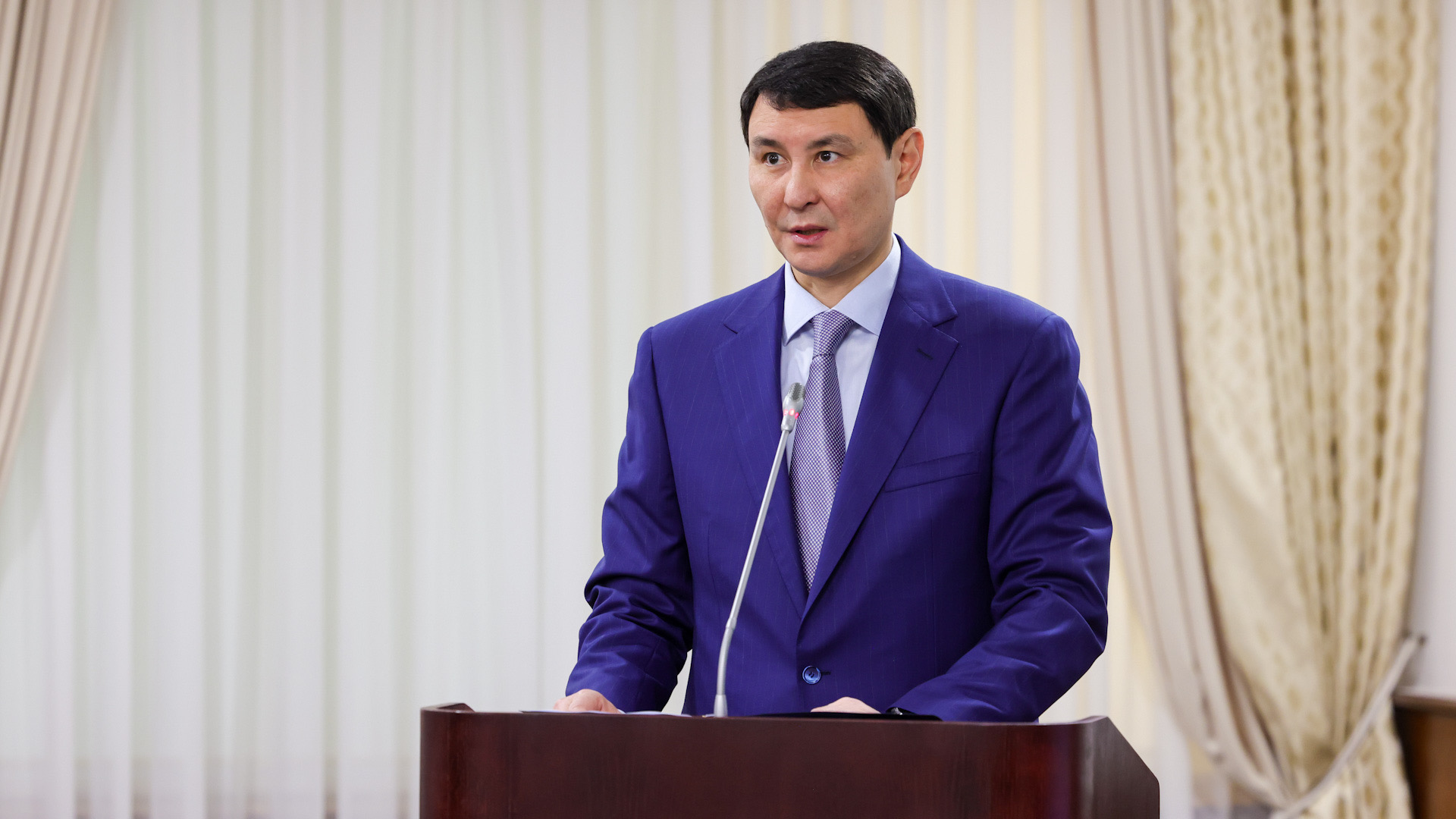13 September 2023, 12:08
 At the Government session chaired by Prime Minister Alikhan Smailov reviewed the results of socio-economic development and implementation of the republican budget for January-August this year. Reports were made by Deputy Prime Minister - Minister of Finance Yerulan Zhamaubayev, Deputy Minister of National Economy Azamat Amrin, Chairman of the National Bank of Kazakhstan Timur Suleimenov.
At the Government session chaired by Prime Minister Alikhan Smailov reviewed the results of socio-economic development and implementation of the republican budget for January-August this year. Reports were made by Deputy Prime Minister - Minister of Finance Yerulan Zhamaubayev, Deputy Minister of National Economy Azamat Amrin, Chairman of the National Bank of Kazakhstan Timur Suleimenov.
As reported by Deputy Minister of National Economy Azamat Amrin, following the results of January-August of this year, the growth rate of Kazakhstan's economy amounted to 4.9%. Including growth in the real sector amounted to 4.4%, and in services - 4.8%.
Positive dynamics is observed in all major industries, with the greatest growth in construction, trade, as well as information and communications
The growth rate of investment in fixed capital amounted to 12.2%.
"The inflow of investments increased in transportation and warehousing - by 49%, education - by 31.9%, trade - by 30.1%, agriculture - by 20.7%, as well as in industry - by 8.5%, including mining - by 5.7%. In the regional context, the best indicators are noted in Mangystau, Abay, Turkestan and Pavlodar regions," Amrin said.
According to preliminary results in January-July 2023, foreign trade turnover increased by 5.7% and amounted to $79.5 billion. Exports amounted to $44.8 billion. Exports of processed goods amounted to $14.2 billion. Imports of goods amounted to $34.7 billion. In general, the positive trade balance amounted to $10 billion.
Thus, the manufacturing industry maintains positive growth rates. The volume of production grew by 3.1%. Positive growth was recorded in 15 regions. The greatest increase is noted in Almaty city, West Kazakhstan Kostanay region, in Abay region
In terms of sectors of manufacturing industry provided production growth in machine building by 28%, including in the automotive industry - by 42% and production of electrical equipment - by 34.3%.
In addition, growth was recorded in the following industries: food production - by 4%, chemical industry - by 3.1%, metal products - by 6.4%, beverages - by 5.4%, plastic products - by 7.5% and light industry - by 19.8%.
Production in the mining industry increased by 4.3%. At the same time, oil extraction increased by 6.6%, gas extraction by 3.2%, extraction of other minerals by 13.6% and mining services by 1.8%. Metal ore mining decreased by 1.2%, coal mining - by 5.5%. The volume of completed construction works increased by 11.4%.
According to A. Amrin, positive dynamics was recorded in 18 regions, with the greatest growth in construction and installation work is noted in the regions of Zhetisu and Abay, West Kazakhstan, Kyzylorda region. For January-August of the current year, 10 million square meters of housing was commissioned, which is 13% more than the indicator of the corresponding period last year. The highest rates of housing commissioning are observed in the regions of Ulytau and Abay, as well as in the cities of Astana and Almaty.
In agriculture, the volume of gross output increased by 0.3%.
Positive growth of production in the industry was recorded in 15 regions. Mangystau region, East Kazakhstan region, Kostanay region and Abay region showed the highest growth.
For all indicators positive growth is observed in West-Kazakhstan region, Kostanay region, Kyzylorda region, North-Kazakhstan region, as well as in the cities of Almaty and Shymkent.
For 6 indicators growth is observed in 8 regions. These are Abay and Zhetisu regions, Akmola, Almaty, Mangystau, Pavlodar, Turkestan, East Kazakhstan regions.
In Aktobe, Zhambyl and Karaganda regions there is positive growth in 5 indicators, in Ulytau region and Astana city in 4 indicators, and in Atyrau region only in 3 indicators.
To ensure further growth of the economy, central and local executive bodies are invited to focus on the following measures.
As emphasized by the chairman of the National Bank of Kazakhstan Timur Suleimenov, in August, inflation continued to slow down while maintaining a positive assessment of business conditions on the part of the real sector.
In Kazakhstan following the results of August, the index of business activity is almost neutral and is 49.9. Current and future business conditions are assessed positively.
"Annual inflation is declining for the sixth consecutive month. The current level stands at 13.1%. The contribution of the food and non-food components to annual inflation is declining, while paid services inflation is increasing.Despite the decline in annual inflation, monthly inflation accelerated to 0.7% from 0.6% in July. Its growth rate is significantly higher than the historical average," Suleimenov said.
Food inflation slowed to 12.4% due to lower prices of food producers and in agriculture. Horticultural products are seasonally cheaper, but the rate of seasonal decline is lower than usual.
Non-food inflation is slowing down, in annual terms amounting to 13.5% in August this year. There is a slowdown in the annual growth of prices for personal goods, household goods, construction materials, medicines on the background of strengthening of the tenge exchange rate in the previous months.
At the same time, the contribution of fuel and lubricants to non-food inflation is increasing due to the increase in marginal retail prices for fuel.
At the same time, in August there was a significant increase in prices for clothing and footwear, household appliances, cars, gas.
Inflation of paid services is accelerating against the background of growth of housing and utility tariffs. In August, tariffs rose by 6.1%, in annual terms - by 13.9%.
In addition, prices for unregulated services are still rising as a result of steady demand on the part of the population, in particular, for urban transportation, cellular communication services, and rent.
Despite the weakening in August, the tenge has appreciated by 0.7% to 459.39 tenge per US dollar since the beginning of the year. The weakening of the tenge in August by 3% was due to the global strengthening of the U.S. dollar.
"The tenge was supported by sales of currency from the National Fund as part of ensuring transfers to the republican budget. In August, they amounted to $770 million. The exchange rate was also affected by the suspension in August of the norm on the mandatory sale of foreign currency earnings by quasi-governmental sector entities. The National Bank continues to adhere to a flexible exchange rate regime and does not conduct foreign exchange interventions. Gross international reserves at the end of August amounted to $93.5 billion," the head of the National Bank informed.
Foreign exchange reserves of the National Bank have decreased by 4.3% to $33.6 billion since the beginning of this year due to the conversion of funds to foreign currency accounts of the Government in order to pay the state debt. A certain impact was also made by the reduction of funds of the BVU on foreign currency accounts with the NBRK on the background of dedollarization of deposits.
Assets of the National Fund increased by 7.5% or $4.2 bln to $59.9 bln since the beginning of this year. The main growth was due to investment income of 6.10% or $3.4 bln since the beginning of this year.
Transfers from the National Fund to the republican budget amounted to 2.9 trillion tenge. For their realization the currency assets of the National Fund were sold for $4.9 billion. Total revenues to the fund from the beginning of the year amounted to 3.3 trillion tenge.
Pension assets of the UNPF demonstrate positive dynamics. Since the beginning of this year they grew by 14.6% to 16.8 trillion tenge. The volume of investment income since the beginning of this year amounted to 1.1 trillion tenge. Pension contributions amounted to 1.4 trillion tenge, while early withdrawals amounted to 164.8 billion tenge.
 In turn, Deputy Prime Minister - Minister of Finance Yerulan Zhamaubayev informed that the state budget for 8 months of this year revenues received 12.5 trillion tenge or the plan executed by 97.2%. The republican budget received 8.3 trillion tenge. The plan was executed by 89%.
In turn, Deputy Prime Minister - Minister of Finance Yerulan Zhamaubayev informed that the state budget for 8 months of this year revenues received 12.5 trillion tenge or the plan executed by 97.2%. The republican budget received 8.3 trillion tenge. The plan was executed by 89%.
Non-fulfillment of the plan on taxes was mainly due to CIT, ETP on crude oil, MET and VAT on imports.
"Non-fulfillment of the plan on CIT was due to a 26% decrease in the amounts of declared advance payments for 306 large taxpayers. The main non-fulfillment of the plan for ETP for crude oil is associated with a 13% decrease in the actual ETP rate from the forecast figure," Zhamaubayev said.
Non-fulfillment of the MET plan was affected by an average 15% decrease in prices for major export goods.
The reasons for non-fulfillment of the import VAT plan are:
- decrease in the volume of imports for certain groups of goods;
- decrease in the volume of imports from the EAEU countries by 10%.
Revenues of local budgets were executed by 118.5% and amounted to 4.2 trillion tenge. The plan was overfulfilled by 659 billion tenge, including 610 billion tenge for taxes. All regions exceeded their revenue plans.
The state budget expenditures were executed by 98.6%, the republican budget - by 99.3%, local budgets - by 98.3%.
The republican budget expenditures amounted to 14.5 trillion tenge.Non-fulfillment amounted to 107 billion tenge, of which 21 billion tenge - savings.
Zhamaubayev also reported that for 8 months of 2023 desk control covered more than 30 thousand procedures of public procurement.
As a result of inspections established violations of 43,514 procedures, of which the objects of state audit executed 93% of notices to eliminate violations. More than 1.5 thousand audit activities were carried out.
The audit covered more than 1 trillion tenge of budget funds. Financial violations amounting to about 140 billion tenge were identified.
Violations were eliminated for 109 billion tenge by restoring the supply of goods, services and works, reimbursement to the budget and accounting. More than 1.5 thousand recommendations were given to improve and increase the efficiency of audit objects.
The Comprehensive Privatization Plan for 2021-2025 provides for the implementation of 658 objects. During the reporting period, 372 objects worth 307 billion tenge were sold and transferred to trust management with the right of subsequent redemption. 33 objects are under auction. 64 objects are directed for reorganization and liquidation. 189 objects are under pre-sale preparation.
#Budget #Economy #Finance #Government session #Yerulan ZhamaubayevStay updated about the events of the Prime minister and the Government of Kazakhstan - subscribe to the official Telegram channel
Subscribe